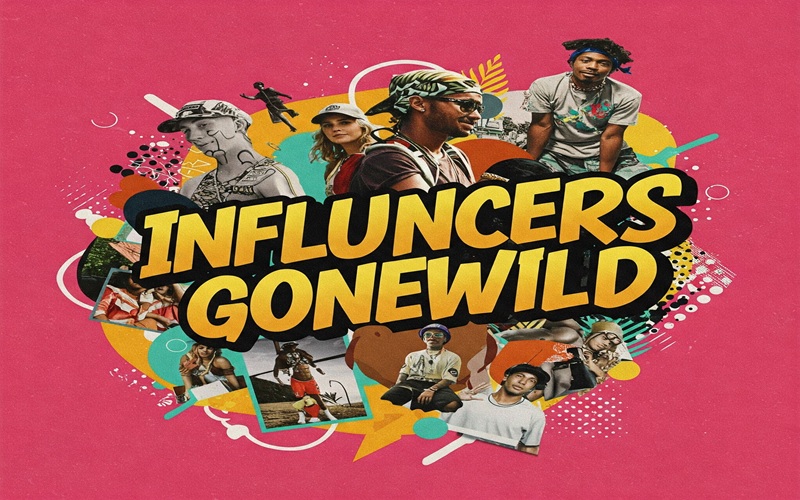In the digital age, social media influencers have become powerful figures, shaping trends, opinions, and consumer behavior. However, with great influence comes great responsibility, and not all influencers handle their fame responsibly. The term “InfluencersGoneWild” has emerged to describe instances where influencers engage in controversial, reckless, or ethically questionable behavior. This article explores the rise of influencer culture, the various controversies surrounding influencers, the impact of their actions on society, and the broader implications for influencer culture.
The Rise of Influencer Culture
What Defines a Social Media Influencer?
A social media influencer is an individual who has built a substantial online following and has the ability to affect purchasing decisions, public opinions, and trends. They typically gain popularity through engaging content, relatability, or expertise in specific niches such as fashion, fitness, gaming, technology, and lifestyle.
How Influencers Gain Fame
The path to becoming an influencer involves a mix of strategy, content creation, and audience engagement. Key factors contributing to influencer success include:
- Consistent content creation: Posting regularly to maintain audience engagement.
- Authenticity and relatability: Followers connect more with influencers who appear genuine.
- Brand collaborations and sponsorships: Partnerships with brands boost visibility and income.
- Viral moments and challenges: Participating in trending topics or viral challenges can propel influencers to fame.
The Power and Responsibility of Influencers
As influencers gain fame, they hold significant responsibility in shaping societal values, consumer trends, and cultural conversations. However, not all influencers uphold ethical standards, leading to situations where they misuse their influence.
Influencers Gone Wild: The Dark Side of Social Media Fame
What Does “InfluencersGoneWild” Mean?
The phrase “InfluencersGoneWild” broadly refers to situations where influencers engage in reckless, unethical, or controversial behavior, often leading to scandals. This can range from irresponsible stunts, fraud, offensive remarks, unethical business practices, or abuse of power over their followers.
Examples of Influencer Controversies
Fraud and Deception
Many influencers have been caught engaging in fraudulent activities, such as:
- Fake giveaways: Promising prizes that never materialize.
- Buying fake followers and engagement: Artificially inflating their social media presence.
- Scamming followers: Promoting products or services that are fraudulent or misleading.
Example: In 2021, several influencers were exposed for running fake cryptocurrency promotions, convincing followers to invest in fraudulent projects that resulted in financial losses.
Reckless Behavior and Dangerous Stunts
Some influencers engage in irresponsible stunts to gain views, leading to real-world consequences. Examples include:
- Trespassing and vandalism: Entering restricted areas for viral content.
- Dangerous pranks: Conducting pranks that put people at risk.
- Health misinformation: Spreading false or misleading health claims.
Example: Some YouTubers have faced legal action for filming pranks in airports, hospitals, or government buildings, causing security concerns.
Offensive Remarks and Cultural Insensitivity
InfluencersGoneWild have often been criticized for making racist, sexist, homophobic, or culturally insensitive remarks. These controversies usually lead to public backlash and brand partnerships being terminated.
Example: A well-known fashion influencer lost sponsorships after making racist remarks in a live stream, sparking widespread criticism.
Unethical Business Practices
Many influencers launch their own brands or businesses, but some engage in unethical practices, such as:
- Selling low-quality or overpriced products.
- Failing to deliver products after accepting payments.
- Misleading advertising about product benefits.
Example: Several influencers have been accused of launching beauty brands with products sourced from cheap manufacturers while charging premium prices.
The Impact of Influencer Scandals
Why Do Influencers Engage in Controversial Behavior?
Several factors contribute to the “InfluencersGoneWild” phenomenon:
- Chasing Virality: Shocking content gets more views, likes, and shares.
- Monetization Pressure: More engagement often means more brand deals and ad revenue.
- Competitive Environment: The influencer space is crowded, and controversy can make one stand out.
- Echo Chambers: Surrounding themselves with yes-men prevents influencers from recognizing their mistakes.
- Lack of Accountability: Many influencers face few real-world consequences, encouraging reckless behavior.
Consequences of “Going Too Far”
While some influencers bounce back from scandals, others face long-term damage to their careers and personal lives. Common consequences include:
- Loss of sponsorships and partnerships.
- Public backlash and “cancel culture” responses.
- Mental health struggles due to online hate.
- Legal repercussions, including lawsuits and arrests.
The Role of Social Media Platforms
Social media platforms like YouTube, Instagram, and TikTok have a responsibility to moderate content and hold influencers accountable. However, their actions often seem inconsistent, with some influencers facing bans while others continue to thrive despite scandals. To address this, platforms have introduced measures like:
- Demonetizing controversial creators.
- Suspending accounts that violate ethical guidelines.
- Introducing stricter content moderation policies.
The Future of Influencer Culture
With increasing scrutiny on social media stars, the era of unchecked influencer behavior may be ending. Moving forward, we may see:
- More regulation and guidelines for influencers.
- Greater audience awareness and critical thinking.
- Brands becoming more selective in influencer partnerships.
Conclusion
The InfluencersGoneWild phenomenon reflects the ever-evolving landscape of social media, where attention-grabbing content reigns supreme. While this trend fuels engagement and entertainment, it also raises ethical concerns and risks for influencers, brands, and audiences alike. As digital culture shifts, greater accountability, responsible content creation, and a balance between authenticity and entertainment may define the future of influencer marketing. Understanding these dynamics will be crucial for brands, creators, and consumers navigating this fast-paced digital world.
FAQs
What is InfluencersGoneWild?
InfluencersGoneWild refers to influencers who push boundaries with bold, controversial, or sensational content to capture attention and engage audiences.
Why do influencers engage in extreme content?
Many influencers create wild content to boost engagement, gain followers, and increase visibility. Entertainment value, authenticity, and FOMO (Fear of Missing Out) also drive audience interest.
Is InfluencersGoneWild a positive or negative trend?
It can be both. While it attracts high engagement, it also raises concerns about ethics, responsibility, and brand reputation.
